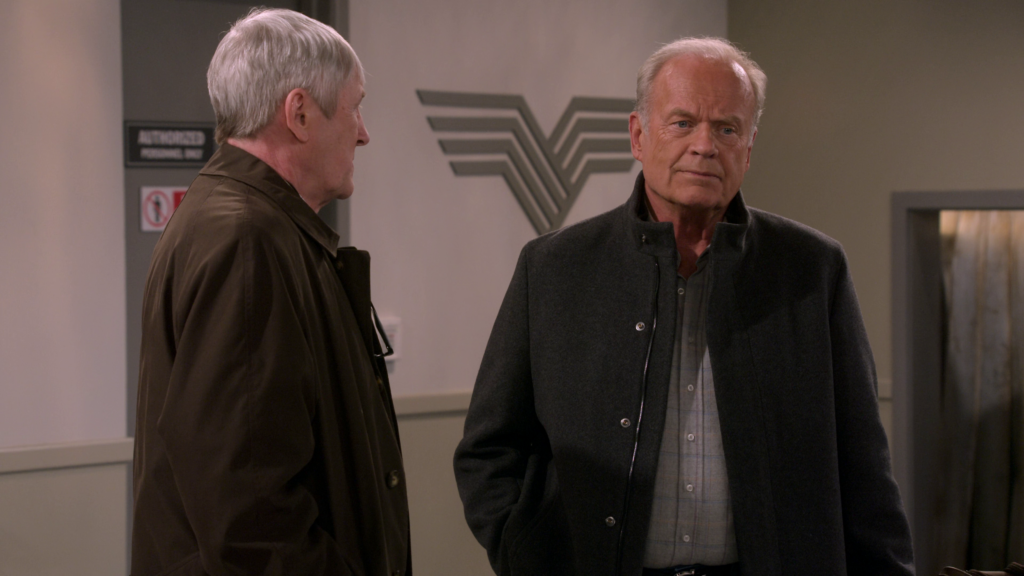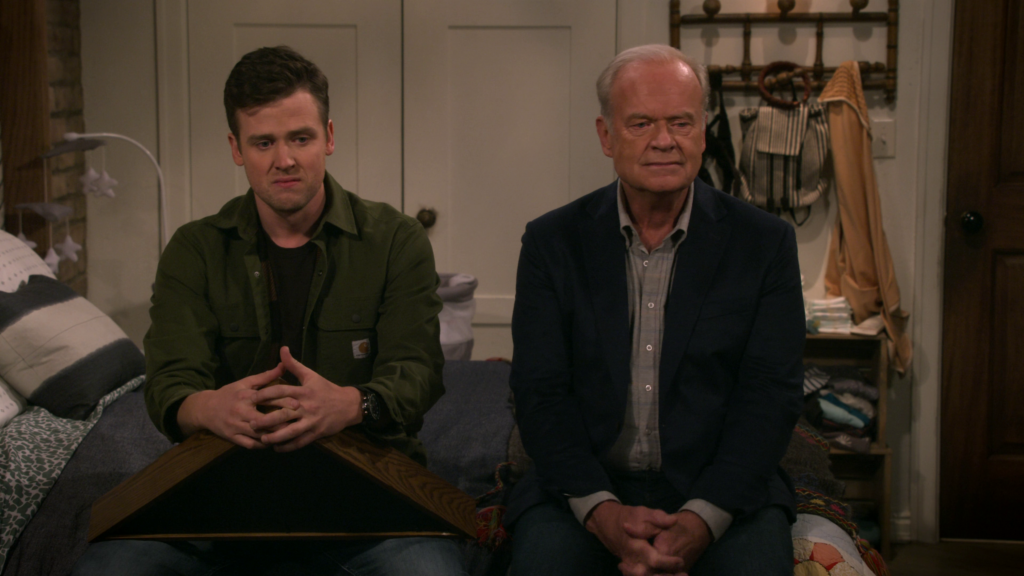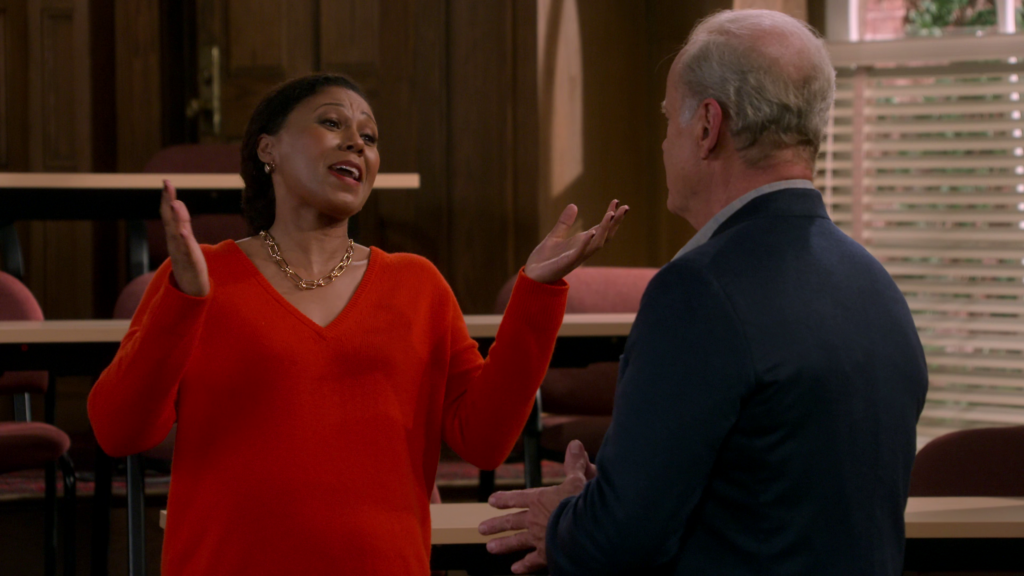Frasier’s return is a worthy successor to the ’93 pilot. “The Good Father”, reviewed.
Truly there’s never been a better time for 1990s TV than the seven years from 2016 to 2023!
The last half decade saw Fuller House at the vanguard of a wave of reboots and revivals of 90s fare, including Will & Grace, Roseanne, Night Court, The Fresh Prince of Bel-Air, Star Trek: The Next Generation, Twin Peaks, Quantum Leap, The Crystal Maze and even children’s shows like Ducktales and Rugrats. For me, a middle-aged man, I choose to believe this golden age will last forever. Surely the industry’s not exploiting the last years of my relevance before the shows I love move to networks with names like “Vintage” and “Sundial” betwixt ads for stair lifts and funeral homes.
For Frasier fans, a reboot has seemed at once an impossible dream and an inevitability, as since 2016 the idea has been mooted and discussed by Kelsey Grammer in interviews and rumours have swirled. Those rumours finally turned into an official announcement two years ago, and then excruciatingly slow progress was made. Slow until this week when to much fanfare the first new episode of Frasier in almost 20 years was released unto the world.
(The remainder of this article contains spoilers for Frasier 2023 Season 1, Episode 1, “The Good Father“)
How do you revive a show like Frasier without a return from any of the supporting players? The writers and producers of the debut episode set themselves a seemingly insurmountable challenge: The original Frasier was blessed with arguably the strongest ensemble cast ever assembled for a situation comedy, and the original pilot stands as one of TV’s greatest first acts; sublime performances and tight, crisp writing as the show deftly defines each character and their roles with a large helping of wit and whimsy. Not a scene or a line of dialogue is wasted, and the relationships are written with genuine pathos. The showdown between Martin and Frasier, played straight, is brave choice for the first episode of a series. It’s a winning gambit, delivering emotional punch without veering into the mawkish.
The first episode of the revival is guaranteed to draw comparisons to this masterpiece, and the safe choice would be a lighthearted pilot that avoids resemblance. Instead, the writers of the new show lean into the past, with an intentional companion piece mirroring that earlier show. Even the title reflects the past, “The Good Son” becomes “The Good Father“.
On a personal note, I am unabashedly a fan of Frasier, but I’d intended to see the first episode blind without the bias of other reviews colouring my opinion. But fanaticism breeds anticipation, and the anticipation was such that I couldn’t keep myself from reading several prior to the premiere. The reviews were mixed, and while it would be a poor use of my time to offer a point by point rebuttal, there’s one oft-repeated criticism that I feel bears discussion: The show suffers by attempting to recreate the past rather than find its own direction. In short, I disagree. This show’s audience will, by definition, include those with fond memories of the original series and it’s a fine line to walk to keep the revival recognisable as Frasier while showing enough originality to maintain the viewer’s interest. The opening episode manages this by flipping the script; the haughty and pretentious Frasier is now the elder statesman returning to build the relationship with his blue collar down-to-earth son. This reversal of roles may seem obvious, but feels like a natural progression and should provide plenty of opportunities to explore the dynamic in fresh ways.
And so, Fraiser is still recognisable as Frasier, both the show and the eponymous character. Kelsey Grammer honed the role over 20 years and it shows as two decades later he slips back into character effortlessly. There’s no time needed to settle in — the cadence, comic timing and mannerisms right down to his facial expressions are spot on. In fact Grammer’s performance is so strong that even when the jokes are clearly signposted, he sells them with the delivery and still produces the laugh.
Frasier the man is the same old Frasier. A little older and perhaps a touch mellowed by the wisdom that brings. He’s also a great deal richer, his TV show in Chicago having been a rousing success in the years since we last spend time with him. Sadly, Charlotte left him, and if I have one complaint about the backstory it’s that the happy ending from the previous finale is now undone.
The episode itself doesn’t quite hit the ground running. The audience applauds Frasier’s entrance in the first scene, and after some brief expository dialogue between Frasier and Alan Cornwall, we’re introduced to Niles and Daphne’s son, David. David’s introduction doesn’t really work here, with newcomer Anders Keith doing what can be fairly described as a David Hyde-Pierce impersonation with added pratfalls. He falls over a suitcase, fights the effects of sleeping pills and caffeine, and has a misunderstanding with a helpful stranger. All of this may have been funnier if we’d gotten to know the character first but feels a bit too much this soon. It’s left to Nicholas Lyndhurst to save the scene with his slow realisation that he’s trying to cheer David up by telling an embarrassing story about… David himself.

We don’t really get to know David, beyond comic relief, and as that comedy, much like David, falls flat, the character never really clicks. It will be left to future episodes to redress this.
Let’s talk about Nicholas Lyndhurst. It’s truly wonderful to see him back in a television comedy after shunning the screen for so long since the last Only Fools and Horses reunion. There was always the fear that it would be impossible to watch him play any comedic role without seeing Rodney Trotter, but it’s a credit to Nicholas as an actor that we accept him as Alan Cornwall almost immediately. Casting him as an old friend of Frasier’s from his Oxford days is inspired. We know Frasier’s Boston friends intimately, but his days in Oxford are part of the character’s history that’s largely untapped. Having Alan take up a position at Havard makes perfect sense and leaves no suspension of disbelief necessary on the part of the viewer.
Alan is clearly designed as a foil for Frasier in the way that Niles was, but he’s no carbon copy. While he may share Nile’s sharp wit and erudition, his morals are perhaps more in line with those of Daphne’s brother Simon. He’s affable and often means well, but is frequently out for his own selfish interests.
Freddy is played by Jack Cutmore-Scott who does a fine job up against Kelsey Grammer’s Frasier. Their interactions are purposefully awkward and the actor’s portrayal of a man who’s leaving many things unsaid as he feels put upon by his father’s sudden reappearance in his life, is true to life. The show’s best scenes are between Frasier and Freddy, and the two leads play off each other superbly. The scene where Frasier realises that he perhaps wasn’t the perfect father, having not been there when Freddy’s friend died, and leaving Martin to step in is heartbreaking and played perfectly by both men. That Frasier has successfully forgone jokes for this sort of sincere tone in both pilot episodes is a testament to everyone, writers, producers and cast, old and new.

In style, the show is true to its roots and manages to keep the same pacing as its 1993 counterpart, rather than adopting the quick cut style that’s become more common as TV comedies have shortened from 24 minutes to 20 or 21. The pilot benefits from a 29 minute run time, giving everything room to breath, and no scenes are hurried. Likewise, the humour is much as it was, with clever wordplay, cutting remarks, misunderstandings and moments of out and out farce. The dinner scene in particular is a stand-out and reminiscent of many lauded Frasier episodes. As Frasier desperately tries to reconnect with his son, each of the other cast is in it for their own various ends.
Toks Olagundoye is well-cast as Olivia, on the surface the consummate professional and antithesis of Alan, but once the veneer cracks, motivated by her own insecurities and wants. These are traits that Frasier himself has shown over the years, but the character also has more than a little Roz Doyle to her.

Finally there’s Eve who, like David, is someone who plays a role but who we never really get to know. She’s an actress turned bartender, single mother and former partner of Freddy’s deceased friend. Her purpose here is narrative — as part of the mystery that drove Frasier and Freddy apart, and to provide a reason for Freddy to move in with Frasier by the episode’s end. As such, Jess Salgueiro gets plenty of screen time but no more than a superficial look at her character. That said, she plays the part admirably and clearly has a lot of fun when posing as a private eye during the dinner party. Again, like David, future episodes should take the time to explore Eve more fully.
“The Good Son” is a near perfect half hour of television, and while “The Good Father” was never going to clear a bar that high, it comes close. There are minor quibbles: Eve’s slip of the word “us” was far too obvious, and even for a man of Frasier’s means, the purchase of Freddy’s building was completed with unrealistic haste, but they’re easy to look past. Such small complaints don’t matter. Smart, funny and poignant, Frasier is back, and it’s as sharp as ever.
Just watch out, because if the scenes between Freddy and Frasier don’t move you, the final tribute to John Mahoney most certainly will.
Odds and Ends
- Did Macallan pay for the product placement? That would certainly be on-brand for that distillery, and it was mentioned many times.
- Speaking of the scotch, Frasier was seen drinking 25 year old Glenfarclas in the original show and 25 year old Macallan in the revival. Aside from demonstrating Frasier’s expensive taste, both these whiskies are primarily aged in sherry casks, which is either a nice detail or a complete coincidence.
- Hoi Polloi literally translates from the Greek as “The Many”, so Frasier feels amalgamated with “The Many Many”. You’d think a man of his education wouldn’t make that mistake.